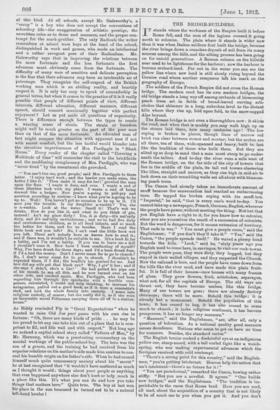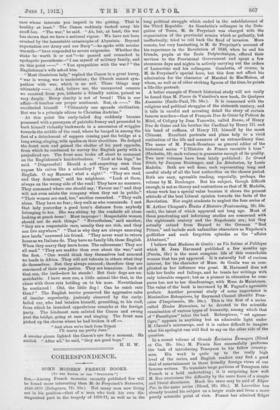THE BRIDGE-BUILDERS.
IT stands where the workmen of the Empire built it before Rome fell, and the men of the legions crossed it going north to colonize. The plain where it stands is wider now than it was when Italian soldiers first built the bridge, because the river brings down a ceaseless deposit of soil from its many sources among the hills, and the silting process has been going on for untold generations. A Roman column on the hillside near used to be lighthouse for the harbour; now the harbour is become orchard-land. Far out in the water you can see the yellow line where new land is still slowly rising beyond the Cornice road where another conqueror left his mark on the geography of Europe.
The soldiers of the French Empire did not cross the Roman bridge. The modern road has its own modern bridges, the old bridge stands a long way off among orchards of blossoming peach trees set in fields of broad-leaved curving arti- chokes that shimmer in a long, unbroken level to the distant hills where they rise up, fold upon fold, to the snow-capped Alps beyond.
The Roman bridge is not even a thoroughfare now : it skirts the road, and when that is muddy you may walk high up on the stones laid there, how many centuries ago I The low coping is broken in places, though lines of narrow red brick run clear between stones and mortar; but the arches are all there, ten of them, wide-spanned and heavy, built to last like the tradition of those who built them. But they are silted up so deep in sand that a man must stoop to go under- neath the tallest. And to-day the river runs a mile west of the Roman bridge, on the far side of the city of towers that lies in the middle of the plain, its tall red towers clustering like lilies, straight and narrow, as they rise high in mid-air to look down on their crumbling walls set all about with blossom; ing peach trees.
The Canon had already taken an immoderate amount of snuff because the conversation had reached an embarrassing turn. He tapped the broken coping with his snuff-box. " Imperial," he said, " that is every one's word to-day. You cannot take up a newspaper, French, German, English, wherever the people have power, without meeting the thing. Not but that you English have a right to it, for you know how to colonize, since you are yourselves the result of a succession of colonists. But the word is dangerous, for it means extension of territory. That ends in war." " You must give a people room," said the Englishman; " if you don't they'll take it." " Yes," said the Canon, "the people spreads itself." He waved a plump hand towards the hills. "Look," said he, "sixty years ago you English used to come here, in carriages, to visit our rock-towns. The people were poor, they were dirty, they begged, but they stayed in their walled villages, and they respected the Church. Now the railroad is here, and the people have come down from the hills like the river mud, and have made this plain fruit= ful. It is full of their houses—new houses with many frames of glass. They grow flowers, fruit, artichokes, asparagus, what not, for all the capitals of Europe. The old ways are thrust out, they have become useless, like this bridge. Many of our towers are gone; there are already factory chimneys ; there will be more. Behold this bridge ; it is already but a monument. Behold the population of this town ; it has ceased to beg, it has also ceased to come much to church ; it lacks religious sentiment, it has become prosperous, it has no longer any manners."
"Manners," said the Englishman, "are, after all, only a. question of toleration. As a national quality good manners means decadence. Nations who mean to get on have no time for manners. Besides, the standard varies."
The English terrier cocked a disdainful eye at an indigenous yellow cur, sharp-nosed, with a tail curled tight like a watch- spring, who was making experimental advances which the foreigner received with cold contempt.
"There's a strong point for this country," said the English- man, " you're getting intolerant. Heaven help the nation that isn't intolerant—there's no future for it " " You are paradoxical," remarked the Canon, bowing rather stiffly. "But you are a novelist. It agrees." "One builds new bridges," said the Englishman. "The tradition is im- perishable in the races that Rome bred. Here you are mad, all mad, about the acquisition of a country that is not likely to be of much use to you when you get it. And you don't
care whose interests you imperil in the getting. That is healthy at least." The Canon suddenly tucked away his snuff-box. • " The war," he said. " Ah, but, at least, the war has shown that we have a national vigour. We have not been crushed by the lamentable catastrophe of Abyssinia. Beyond expectation our Army and our Navy "—he spoke with seoular warmth—" have responded to severe exigencies. Whether the stake be worth it or not "—he paused and remarked in apologetic parenthesis—" I am myself of military family, and on this point —." " You sympathize with the war P " the Englishman's wife asked him.
" Most illustrious lady," replied the Canon in a great hurry, " war is wrong, war is unchristian ; the Church cannot sym- pathize with war, which is an evil. These things may ultimately And, believe me, the unexpected censure we received from you, hitherto a friendly nation, pained us very deeply. Every charity is not of bread This is our affair—it touches our proper sentiment. But, eh —." He recollected himself. "Ultimately one spreads civilization. But war is a principle odious to Christian doctrine."
At this point the curly-tailed dog suddenly became possessed with a paroxysm of patriotic frenzy and proceeded to bark himself violently backwards in a succession of wriggles towards the middle of the road, where he barged in among the feet of a detachment of sappers coming past the bridge at a long swing, singing, with spades on their shoulders. He dodged the front men and gained the shelter of his yard opposite, from which he continued to survey the English party with a prejudiced eye. The front man broke off short to comment on the Englishman's knickerbockers. "Look at his legs," he said. " Disgraceful ! Should a self-respecting man thus expose his calves like a schoolboy P They are mad, these English. 0 my Mamma! what a sight! " • "They are mad, and they domineer," said his neighbour. " Look at them, always on the wrong side of the road 1 They have no manners. They command where one should say, ' Favour me ! ' and they will not even salute the company when they eat in public." " Their women are mad, too," another remarked. " They walk alone. They have no fear; they walk as who commands. I met that lady yesterday a good °hour's distance from anybody belonging to her. She was sitting by the roadside all alone looking at peach trees 1 Most improper 1 Respectable women should not do such things." " Nevertheless," said another, "they are a respectable race, usually they are rich, and they can live anywhere." " That is why they are always annexing new lands," answered his friend. "They never want to return home as we Italians do. They have no family life, these English. When they marry they leave home. The callousness They are all mad." "They are madder than ever about the war," said the first. " One would think they themselves had annexed no lands in Africa. They will not tolerate in others what they do themselves. But they always succeed; therefore they are convinced of their own justice. They are tenacious. Look at that one, the lord—how he stands ! But their dogs are un- matchable. I have seen one, a little animal like that, in the chase with three rats holding on to his nose. Nevertheless he continued ! Oh6, the little dog ! Can he catch rats then 1' " The English terrier preserved the aggressive calm of insular superiority, jealously observed by the curly- tailed cur, who had betaken himself, grumbling, to his roof, from which he launched opprobrious remarks at the foreign party. The hindmost men saluted the Canon and swung past the bridge, going at ease and singing. The front man picked up the chorus where he had broken it off :- "And when we're back from Tripoli I'll marry my pretty Jane."
A secular gleam lighted the Canon's eye for a moment. He smiled. " After all," he said, " they are good boys."
H. H. W.







































 Previous page
Previous page